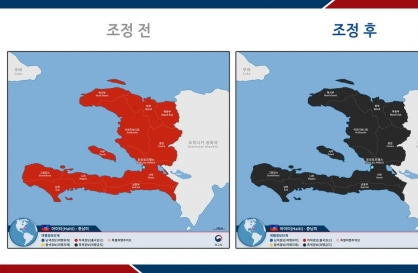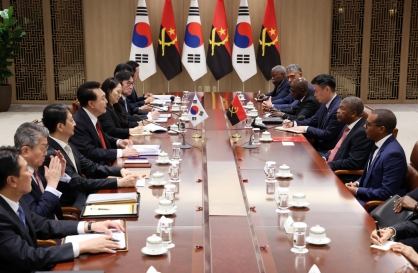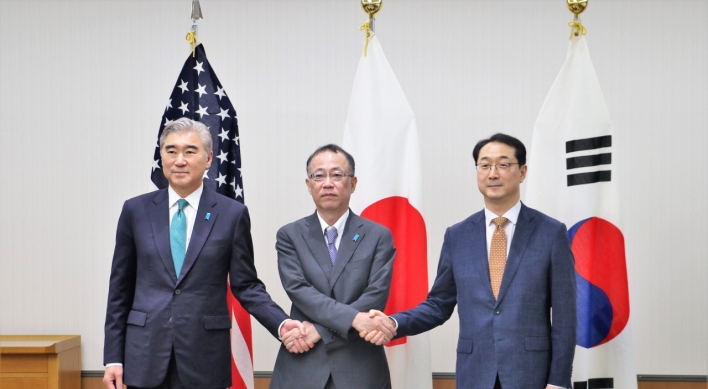Over 8,000 gather in Jeju for world’s largest environmental event
JEJU ― The IUCN World Conservation Congress kicked off its 10-day run on Jeju Island on Thursday, with over 8,000 participants from around the world in attendance.
Over 8,600 people have registered for the conference, the largest in history, said the organizer, the International Union for Conservation of Nature.
Under the theme “Resilient Nature,” participants will hold discussions on 176 initiatives that include climate change, protection of endangered species and establishing a green economy.
The theme suggests that nature may have remedies for the challenges that mankind faces today, such as climate change, poverty and development, organizers said.
JEJU ― The IUCN World Conservation Congress kicked off its 10-day run on Jeju Island on Thursday, with over 8,000 participants from around the world in attendance.
Over 8,600 people have registered for the conference, the largest in history, said the organizer, the International Union for Conservation of Nature.
Under the theme “Resilient Nature,” participants will hold discussions on 176 initiatives that include climate change, protection of endangered species and establishing a green economy.
The theme suggests that nature may have remedies for the challenges that mankind faces today, such as climate change, poverty and development, organizers said.

“Nature is inherently strong, but we must improve how quickly nature and people adapt to change,” Julia Marton-Lefevre, director-general of the IUCN.
“If we strengthen nature, we’ll see that ecosystems are more resilient and people, communities and economies are healthier.”
Yoo Young-sook, Korea’s environmental minister, hoped that the Jeju conference will be serve as a momentum for countries in Northeast Asia and beyond to seek nature-based solutions to many of the problems they face today.
“My hope is that after the conference, nature-based approaches become the talk of the town globally,” she said in a press conference held prior to the opening ceremony.
Taking place every four years, the WCC is the largest and one of the most important events for the global environmental community. It is the first time in its more than 60-year history that the congress is being held in Northeast Asia.
The WCC consists of two major sections: One is a large forum ― a marketplace of ideas, where participants from all sectors of society exchange ideas and experiences and discuss what needs to be done. The second part is a global environmental parliament where governments and NGOs debate and vote on major issues.
The event’s 10-day schedule is packed with numerous discussions, workshops, seminars, roundtables and receptions on a wide range of issues ― some of political importance and others of technical value.
One of the special programs is the World Leaders’ Dialogue, in which influential figures ― world leaders, environmental experts and businessmen ― will deliver public lectures and lead discussions on key subjects such as climate change, poverty, green growth, nature and food security and nature conservation.
Taking an open format, it is designed to be a platform of thought-provoking, lively debates with the interaction with the general public.
For Korea, the Jeju event is a much-desired opportunity to promote its efforts to make Asia’s fourth-largest economy greener.
“It is a chance for Korea to introduce to the world the country’s efforts and accomplishments toward green growth,” said Kim Chong-chun, secretary-general of the Korean Organizing Committee.
As the host country, Korea is organizing various forums, workshops and seminars on issues concerning Northeast Asia, the country’s past experiences and the ongoing pursuit of a low-carbon, green economy.
It proposed 20 motions to the IUCN, reflecting Korea’s environmental issues for the first time, including one proposing establishment of an IUCN Northeast Asia Regional Office in Korea. The motions are to be voted upon at the IUCN general assembly.
At the end of the event, the IUCN is expected to adopt the Jeju Declaration, the first of its kind in the union’s history. The declaration suggests green growth as a solution to global nature conservation and environmental challenges, and includes ways to establish the “World Leaders Conservation Forum,” organizers said.
By Lee Sun-young (milaya@heraldcorp.com)
-
Articles by Korea Herald



















